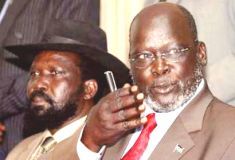Garang pledges not to allow southern Sudan to be used to attack Uganda
KAMPALA, Uganda, Jan 26, 2005 (AP) — Southern Sudan’s rebel chief pledged Wednesday not to allow territory under his control to be used to launch attacks against neighboring Uganda.

|
|
Sudan’s People Liberation Army leader John Garang (R), flanked by his deputy Commander Salva Kiir Majardit, answers a question during an SPLA press conference in Kenya’s capital Nairobi, January 8, 2005. (Reuters). |
John Garang, who recently signed an agreement officially ending his country’s 21-year civil war, said Uganda should also be allowed to resolve its 18-year conflict.
“Now that Sudan has acquired peace, the next place is Uganda,” he told a crowd of thousands gathered to celebrate Ugandan President Yoweri Museveni’s 19 years in power. “I will not allow any elements to stand in Sudan and destabilize Uganda.”
If Garang succeeds, it would be a serious setback to Uganda’s rebel Lord’s Resistance Army, which has established bases in remote southern Sudan from which it wages its insurgency in northern Uganda.
Until now, Garang has not controlled the area in which the bases are located. But a Jan. 9 peace accord gave his Sudan People’s Liberation Army authority over an autonomous south for the next six years. The region will then vote on succession.
“I, Garang, and the people of southern Sudan will stand in solidarity and work for peace in northern Uganda,” said the Sudanese rebel leader, a close friend of Museveni who was invited to address the annual festivities at an airstrip near the capital, Kampala.
The Lord’s Resistance Army is made up of the remnants of a northern rebellion that began after Museveni, a southerner, took power in 1986.
The insurgents have waged a campaign of killing, rape and abductions that has forced more than 1.6 million people to flee their homes. They replenish their ranks by abducting children and forcing them to become fighters, porters or concubines.
Earlier this month, Museveni said his army was resuming all-out war on the Ugandan rebels, charging that they rejected a cease-fire deal that had been expected to open the way for political talks on ending the conflict. He said Wednesday that his forces were inflicting heavy defeats on the insurgents – a claim which could not be independently verified.
In the 1980s and 1990s, the Ugandan government supported the Sudan People’s Liberation Army in their battle with the Islamic government in Khartoum. The Sudanese government, in return, backed the Lord’s Resistance Army, a cult-like group that has little contact with the outside world.
Sudan and Uganda normalized relations in 2001, and Ugandan troops have been allowed to operate in some parts of southern Sudan under government control. But reports persist of senior Sudanese officials protecting Joseph Kony, the Ugandan rebel leader.
